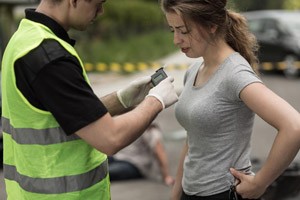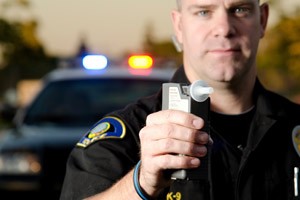Many people do not realize that if you are pulled over in New Jersey and a police officer has probable cause to believe you have been driving drunk, you are required to submit a breathalyzer sample. The law is written in such a way that it is a condition of being allowed to drive in New Jersey. As we have discussed here in the past, in the Edward M. Janzekovich Law Blog, this requirement even surpasses your rights given under the Miranda warnings, which many people are familiar with – meaning you do not even have the right to speak to an attorney or to remain silent before submitting a breath sample at the police station.
If you fail to comply with the requirement to provide a breath sample, you can be charged and/or convicted under N.J.S.A. 39:4-50.4, Refusal to Take a Breath Test, which could carry equally heavy penalties to drunk driving. It is important to note that if you are pulled over, a police officer may ask you to take a roadside or portable breath test (PBT). The PBT is less accurate and refusing to submit to the PBT does not violate the Refusal law. It only counts as “Refusal to Take a Breath Test” if a driver refuses to submit to the more accurate, official breath test that occurs back at a police station.
The Elements of Refusal to Submit to a Breath Test
The offense of refusal to submit to a breath test requires the government to prove four elements beyond a reasonable doubt, before you can be convicted:
- The arresting officer had probable cause to believe that the driver had been driving or was in actual physical control of a motor vehicle on the public road, street, highway or other area of the State while under the influence of alcohol or drugs.
- The driver was arrested for driving while intoxicated.
- The officer requested the driver to submit to a chemical breath test and informed the driver of the consequences of refusing to do so in a language the defendant can understand while sober.
- The defendant thereafter refused to submit to the test.
As we have discussed in the past, the State may be able to charge you with refusal even if you think you are complying with the request to submit a breath test. For instance, the requirement to “submit to the test” includes a requirement that you provide a breath sample that is large enough for the machine to test.
Accordingly, this area of law can be extremely complicated. Because a prosecutor must prove all of these elements in order to convict a driver of refusal, it is important to always contact an experienced DUI lawyer if you or someone you know if ever charged with drunk driving or related motor vehicle violations. A good attorney will be able to review the evidence against you and determine if the state can sufficiently prove all the elements of a crime against you, and will be able to present the best defense on your behalf.
Punishments for Refusal to Submit to a Breath Test
New Jersey law authorizes serious fines for all violators of the Refusal law that ranges from $300 to $500 for a first offense, $500 to $1000 for a second offense, and $1000 for a third or subsequent offense. This does not include any court fees and other applicable monetary sanctions, such as the $100 Drunk Driving Enforcement Fund surcharge. This also does not include the extra $1000 per year motor vehicle surcharge that the driver will have to pay for three years, as well as any increase in insurance premiums that the automobile insurance company will choose to add.
A convicted driver will also be required to attend an alcohol education program at the Intoxicated Driver Resource Center (IDRC). This program includes a fee of $75 per day for a first offender and $100 per day for subsequent offenders. Failing to attend the IDRC will result in a jail sentence, and could result in permanent administrative loss of license for subsequent offenders.
A driver can also lose his or her license for Refusing to Submit to a Breath Test. The period of license suspension is the same as if the driver had been convicted of driving while intoxicated, and ranges from seven (7) months to one (1) year for a first offense, two (2) years for second offense, and ten (10) years for a third or subsequent offense.
Finally, a driver will be required to install an ignition interlock device on his or her vehicle. This requirement ranges from six (6) months to one (1) year after the period of license suspension for first-time offender, or one (1) to three (3) years for a subsequent offender. This also will come at the driver’s own expense.
New Jersey DUI/DWI Attorney Edward M. Janzekovich Can Help if You are Charged with Drunk Driving or Refusal
A conviction on DWI/DUI and refusal charges can mean serious penalties – jail time, heavy fines, and loss of license, that can seriously affect your ability to care and provide for yourself or your loved ones. Defending against these charges can also be very complicated. If you or someone you know is arrested for refusing to submit to a breath test, it is important to have a lawyer who knows how to help. An experienced DWI/DUI attorney can make all the difference. To speak with an experienced New Jersey DWI lawyer about your situation, call us at 1-732-257-1137 or contact us online today. We serve clients throughout the state of New Jersey.





 For nearly two decades, the state of New Jersey has had a legal blood alcohol content (BAC) limit of .08%. That means that if you are pulled over in this state and suspected of
For nearly two decades, the state of New Jersey has had a legal blood alcohol content (BAC) limit of .08%. That means that if you are pulled over in this state and suspected of  The law in New Jersey is different than 48 other states in that it treats a
The law in New Jersey is different than 48 other states in that it treats a 